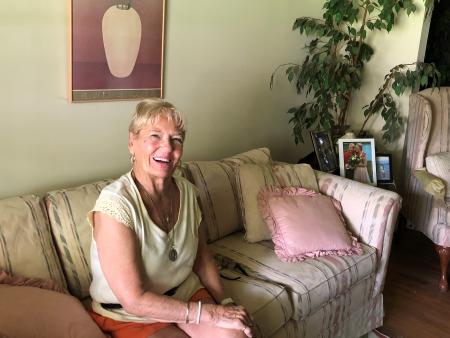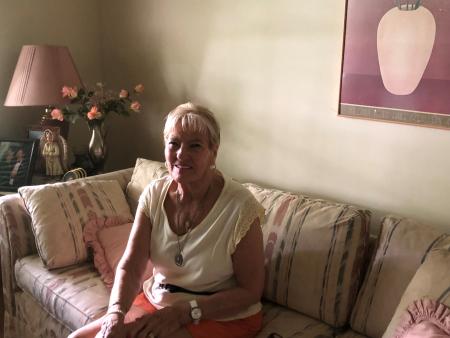
Dutch Treat
Aging has a way of catching up to all of us, but Asta Hellman isn't letting it catch her without a fight. If it gets any closer, she may hit it with her sympathy stick.
Somewhere deep within the double helix of Asta Hellman’s DNA is a strand of stubborn independence. After a broken engagement when she was in her 20s, she wanted to start a new life, so she boarded a steamship, said goodbye to her native Netherlands and set sail for North America, knowing only one person on the other side of the Atlantic. When it got too cold in Toronto where she initially settled, she boarded a bus and rode 38 hours to Florida just to warm up. When she got tired of asking her husband for some spending money, she opened Asta’s Baby Corner, the first consignment store in Ohio.
Do not tell Asta Hellman she can’t do something.

The problem is, aging has a way of putting restraints on us despite our most dogged determination. With her 86th birthday looming on the horizon, Asta Hellman is learning this—perhaps slowly and a bit stubbornly, but learning nonetheless. Walking now requires a cane, although she will debate you over the word “requires.” She fell once, so her son insisted she get a cane to help with her balance, just in case. She fought the idea. She didn’t need it, she insisted, and besides, canes are ugly. Then this one arrived at the door. She doesn’t mind it so much. It’s purple.
“I call it my sympathy stick,” she says. “If I’m in Kroger, people see me with it and they’re like, ‘Oh, let me help you.’"
A devout Catholic, she can’t make it to church anymore, so she watches Mass on TV and a priest from Our Lady of Visitation stops by to give her Communion.
She limits her driving to roads that are slower and a little less busy. “I don’t drive on the highways anymore. There are too many crazy people.”
The situation is common among seniors, who all-too-often struggle with balancing the desire to live independently with the demands and boundaries that aging bring, including not being able to get out and be as socially active as they want to be. That’s especially tough for people like Asta, whose extroverted nature is also clearly stitched into her DNA.
“I love people,” she says. “I must be around people.”
Aside from the Visitation priest, her Meals on Wheels driver, Clint, may be the only other person she gets to sit and talk to during the course of a week. “Oh, he is wonderful,” she says.
One of her sons, who lives in Las Vegas, saw an article about Meals on Wheels. He did a little research and decided home-delivered meals was exactly what his mom needed with her increased limitations. Two days later, Asta was receiving meals.
“I call them my gourmet meals,” she says.
In addition to the quality, the meals offer a flexibility that fits her lifestyle. While she lives alone, she is still a mother and still performs the role lovingly. One of her daughters has been in a nursing home in Mason for the last two years after suffering what was initially thought to be a stroke. She cares for her the best she can, but getting to see her requires outside transportation and a two-hour roundtrip ride, meaning she may not get home until after 8:00 p.m. when she can just begin to think about making herself dinner.
She and her husband, Dick, had five children—three of whom were born on the same day: February 2, Groundhog’s Day. In addition to the son who lives in Las Vegas and the daughter in the nursing home, one son lives in Bellevue, Ky., one daughter is estranged from the family and another daughter passed away at age 50 after battling cancer.
That daughter, Ingrid, was not just a daughter, but her golfing partner. Asta loves golf. She loves it so much that if she wakes up in the middle of the night and can’t sleep, she’ll turn on the Golf Channel and watch reruns of old PGA Tour events.
“I once got to play Pebble Beach,” she says. “My son won a round there, so he took me. I also got a hole in one at another course. I didn’t realize that if you get a hole in one, you have to buy everybody drinks afterward. That’s crazy. They should be buying me drinks.”

Golf kept her both physically and socially active up, but when Ingrid died the golf clubs were set aside. Before golf it was tennis. Before tennis it was her consignment store. It was a new concept in this area, but not new to Asta. Europe was filled with them, she says.
Although she has lived more than two-thirds of her life on this side of the Atlantic Ocean, subtle hints of her Dutch heritage can still be found everywhere. The pair of wooden shoes sit on the table on the front porch of her westside home. A pencil sketch of the Rotterdam waterfront hangs on the wall just inside the front door. A Netherlands sticker adorns the back window of her car.
“I never became an American citizen,” she says. “I told my dad when I was getting on the ship to come to America that I would always be his Dutch daughter. I can still see him standing on the dock waving his red handkerchief as the boat pulled away.”
She walks over and grabs a picture off the table. “Oh, I must show you this,” she says. “This is my family. There were 13 children. My parents were busy. My mom would say, ‘That’s all you father could offer during the war.’ I would say, ‘But Mom, it takes two to tango.’ She didn’t think that was very funny.”
One of her brothers was the one person she knew in North America. He lived in Toronto and gave her a place to stay until she got established, which didn’t take long. The second office she went into and asked about a job hired her on the spot.
“I have two other ladies from The Netherlands who work here and give me 100 percent,” the manager said.
It helped that she spoke four languages: German, French, English and Dutch.
One winter, when the cold got too much, she and a friend jumped on a bus and rode 38 hours to Florida to find some warmth. While sitting in a restaurant, she was approached by a gentleman. He had a cigarette in one hand and a martini in the other. His name was Dick Hellman. He was a manager for Consolidated Freightways in Cincinnati. A love affair burgeoned.
Today, nearly more than half a century later, much has changed. Dick passed away. The kids are grown and scattered. The house is quiet. Life can be lonely, and frustrating. Even at the edge of 86, she still wants to do more.
“I’m still percolating,” she says.
Her mind is still sharp but her body is struggling to keep up, and that’s especially tough when a strand of stubborn independence is woven into your DNA.
